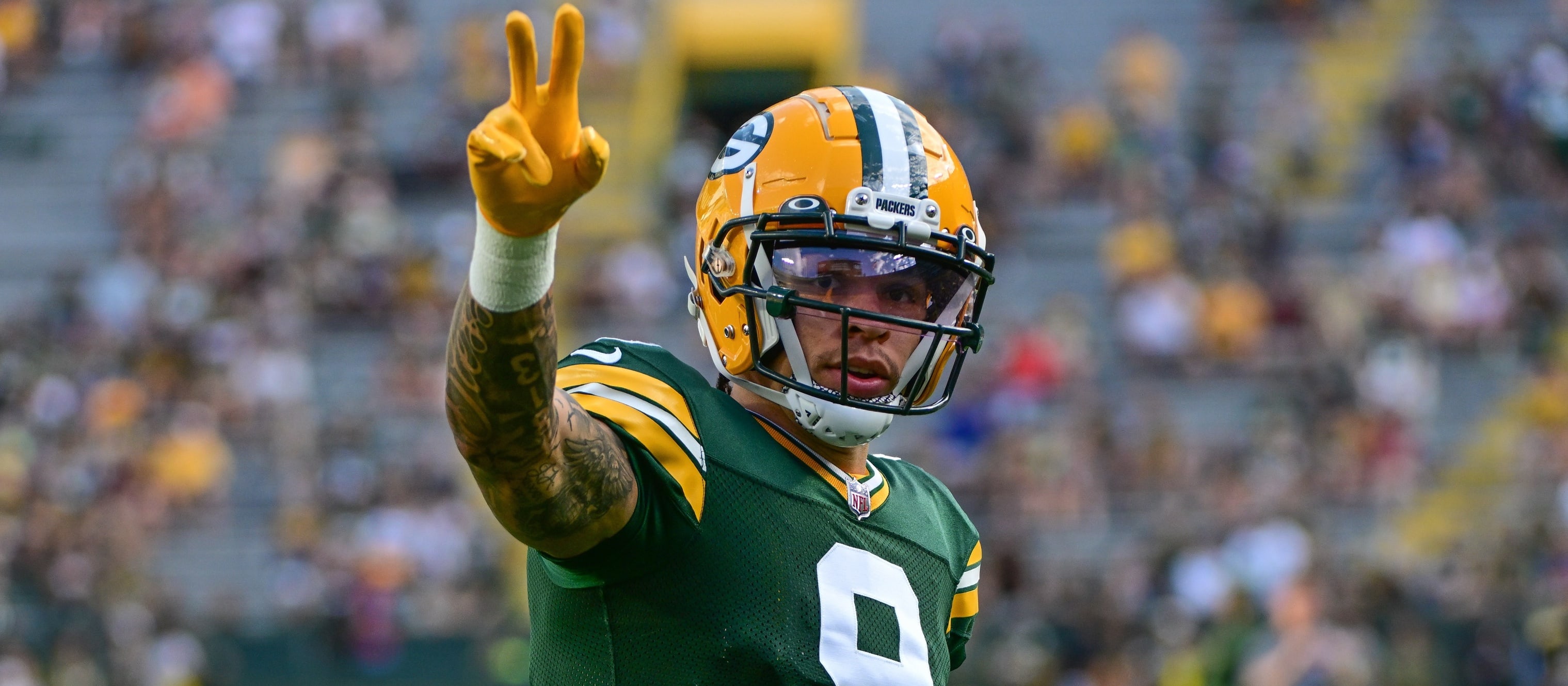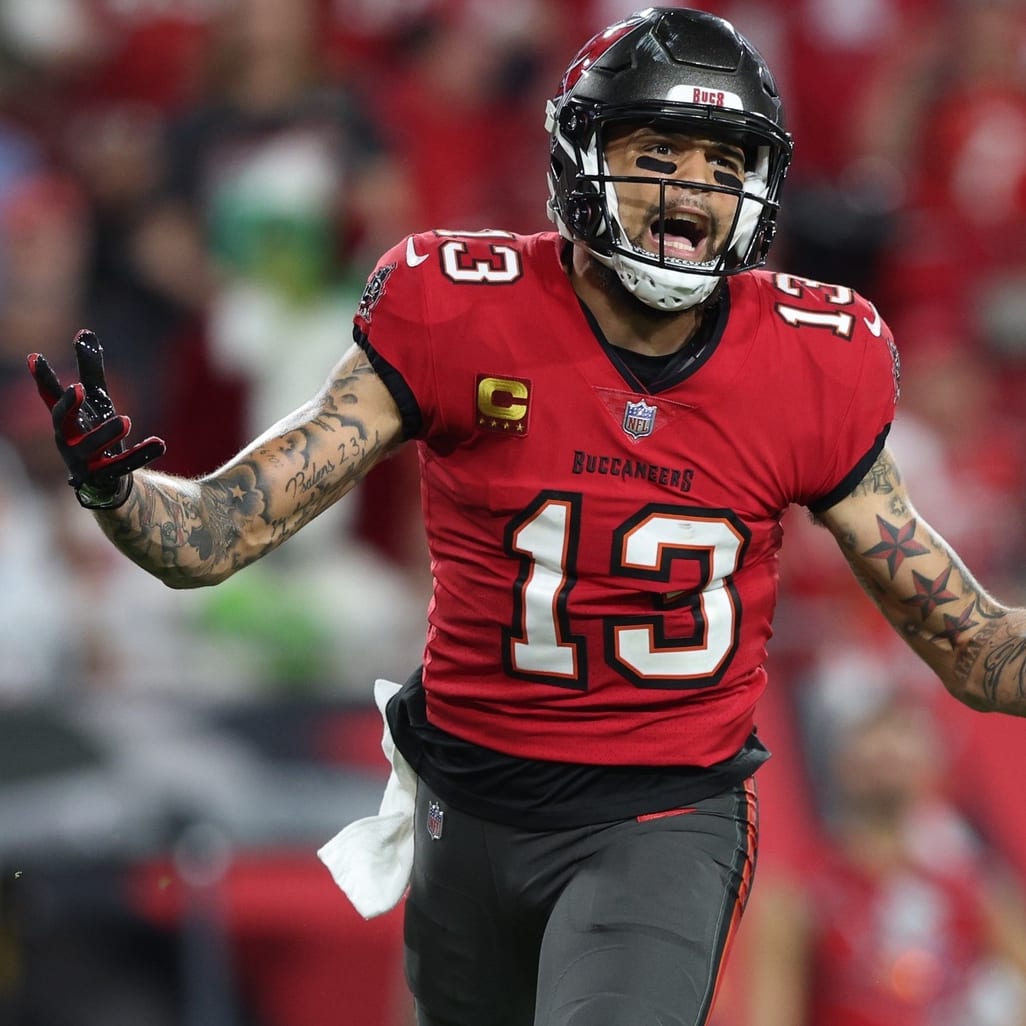This article is part of our Best Ball Strategy series.
This article will break down five of the worst wide receiver values in the current ADP on Underdog NFL best ball.
Christian Watson, WR, GB (75.2 ADP)
Watson has some clearly useful utilities and is definitely a compelling big-play threat, but some fantasy drafters are still clinging to the dream of Watson being the WR1 in Green Bay based on dubiously-reasoned hype from one year ago. As much as injuries have been a problem for Watson, and as much as there might be reasonable hope for improved durability after he had his gait altered this offseason, Watson has skill set limitations that generally have gone unacknowledged.
More specifically, while Watson will always be a good bet for high YPT and good touchdown production, he does not have the ability to consistently draw the necessary variety of targets to draw the target rates of a WR1. Instead, Watson's sum of traits more so resembles a big-play specialist with middling volume. In an ascending offense Watson will likely provide high efficiency but not at the volume levels necessary to break out.
Like North Dakota State did previously, the Packers discovered over the last two years that Watson is mostly a high/low wideout – one who can thrive consistently in two areas but not more than that. Watson is dangerous on screens or end arounds near the line of scrimmage, but the next depth at which he's threatening is at least a good 10 yards further downfield. The intermediate and lower middle
This article will break down five of the worst wide receiver values in the current ADP on Underdog NFL best ball.
Christian Watson, WR, GB (75.2 ADP)
Watson has some clearly useful utilities and is definitely a compelling big-play threat, but some fantasy drafters are still clinging to the dream of Watson being the WR1 in Green Bay based on dubiously-reasoned hype from one year ago. As much as injuries have been a problem for Watson, and as much as there might be reasonable hope for improved durability after he had his gait altered this offseason, Watson has skill set limitations that generally have gone unacknowledged.
More specifically, while Watson will always be a good bet for high YPT and good touchdown production, he does not have the ability to consistently draw the necessary variety of targets to draw the target rates of a WR1. Instead, Watson's sum of traits more so resembles a big-play specialist with middling volume. In an ascending offense Watson will likely provide high efficiency but not at the volume levels necessary to break out.
Like North Dakota State did previously, the Packers discovered over the last two years that Watson is mostly a high/low wideout – one who can thrive consistently in two areas but not more than that. Watson is dangerous on screens or end arounds near the line of scrimmage, but the next depth at which he's threatening is at least a good 10 yards further downfield. The intermediate and lower middle of the field don't suit Watson, whose speed requires more windup room to unleash into a full gallop. The straighter the route, the better Watson handles it.
Particularly given Green Bay's depth at wideout – all of Jayden Reed, Romeo Doubs and Dontayvion Wicks are more capable than Watson in the intermediate – we're likely to see the Packers use the wideouts in accordance with their respective strengths. There's no reason to force Watson into some task where Wicks is better, and vice versa.
As things stand, the Green Bay wideout with the greatest amount of versatility is probably Doubs. Doubs isn't a target hog, but as last year showed the Packers trust Doubs throughout all situations. Doubs can't make the same kill shots that Watson can, but Doubs can make more of the routine plays that keep the chains moving. Reed is the top fantasy option of the group because he boasts the most per-snap production and should rotate less than Watson or Wicks, but after Reed and Doubs there's just not much left in the way of regular usage for either of Watson or Wicks.
As much as I'm listing Watson first among the fades, that's just because he has the highest ADP of this article. Watson is actually the pick I like most of the players named in the article, I just think Curtis Samuel, Josh Palmer, Tyler Lockett, Rashid Shaheed and some others offer better projections at cheaper prices.
Adonai Mitchell, WR, IND (116.5 ADP)
Mitchell had a ton of top-10 NFL draft hype following his dominant showing at the combine, and it seems like a lot of people have simply struggled to let go of the dream even after Mitchell fell to the mid-2nd round, where he landed in one of the NFL's most run-heavy offenses. The spring markets likely overestimated Mitchell, and it's time to let it go.
Not only was Mitchell himself likely overestimated, but the people drafting Mitchell now are likely guilty of underestimating the incumbent Colts wideouts. Mitchell goes well ahead of Josh Downs (131.1 ADP) while Alec Pierce rarely gets drafted (215.9 ADP). There's no evidence to think Mitchell will outproduce either player in 2024.
Downs provided above-baseline returns last year on an 18.0-percent target share, indicating that Downs can maintain plus efficiency up to something closer to at least a 20.0-percent target share. It's true that Pierce struggled in comparison, registering below baseline due to an awful catch rate, but Pierce's struggles were pretty obviously because he's a downfield wideout and Gardner Minshew can't throw downfield. That, and Pierce was the designated decoy in the offense, often times given routes for the specific purpose of clearing room for Downs and Michael Pittman to get open. Both Downs and Pierce were positive contributors last year – it's not as if the Colts offense is begging for Mitchell to take over to save them from a rotation of bums.
There's little or no reason to think Mitchell will take much from Downs in the slot. Mitchell will make or break his fantasy value as a perimeter wideout, where he'll specifically need to overtake Pierce. It's great that Mitchell is super athletic with a 4.34-second 40 at 6-foot-2, 205 pounds, but Pierce's 4.41-second 40 at 6-foot-3, 211 pounds matches that. There are some underneath, laterally-oriented routes from the boundary where Mitchell is likely better than Pierce, but the rep primarily calls for a vertical presence and Pierce is not easy to dislodge there.
Jakobi Meyers, WR, LV, (119.6 ADP)
Meyers is a good wideout and clearly capable of drawing targets. He provided above-baseline returns on a 20.9 percent target share last year, and at times with the Patriots he thrived with even bigger usage shares. Meyers' problems are circumstantial.
The first problem is that the Raiders quarterback play projects as the worst in the NFL. They're paying Gardner Minshew to unseat Aidan O'Connell, but Minshew was uniquely bad when forced to start for Indianapolis last year, displaying awful efficiency even as the offense shielded him with a robust run game. The Raiders will throw as little as possible in 2024 and they will likely do so with league-worst efficiency.
The second problem is that Meyers' 2024 target share projection is worse than the one from 2023. While it's true we have reason to think Meyers can hold serve with a target share well over 20.0 percent, the 13th overall selection of tight end Brock Bowers all but ends the possibility of Meyers seeing such usage. The third-leading target of the Raiders last year was Josh Jacobs, but now it will probably be Meyers or at the very least Bowers, and Bowers won't be far behind Meyers if he's behind at all.
There's an easier case for Meyers in full PPR, but in Underdog's 0.5PPR scoring the yardage and touchdowns are important. In an offense that could throw fewer than 20 touchdowns, it's hard to see how the pie could be big enough for Meyers, Bowers and Davante Adams to meet their full potential or anything close to it.
Xavier Legette, WR, CAR (138.1 ADP)
Legette is definitely an imposing athlete, boasting sub-4.4 speed on a 221-pound frame, and there are some functions where he clearly excels. Namely, Legette is a compelling downfield threat with ball skills to make long-range receptions at a league-leading pace. He's even dangerous after the catch at any level of the field. There are at least two problems for Legette in 2024 all the same.
The first is that, even if Legette is a downfield monster in the NFL, the Panthers offense is not the right one to display such abilities. Legette is largely the same genre of prospect that Jonathan Mingo was a year ago – big and more toolsy than skilled – and Mingo just endured what might have been the worst rookie receiver season of all time in 2023. Part of that might be a Mingo problem, but even Mingo's biggest hater would have trouble placing all the blame on him for a 50.6-percent catch rate at 4.9 yards per target. Mingo may very well be a bad NFL receiver, but the problems started at quarterback. Young was bad enough that he could improve significantly in 2024 and remain the worst passer in the NFL.
The second problem is that there probably won't be that many targets laying around for Legette. Sure, Mingo was force fed 85 targets last year, but the Panthers will be running Diontae Johnson opposite Legette even when the rookie is on the field. Johnson on the boundary and Adam Thielen in the slot is a duo that will draw targets at a rapid per-snap rate, both because that's what they do in general and because their route depth will be very shallow compared to Legette. Rather than a go-to target, Legette is likely to spend his 2024 season clearing out space as a decoy for Johnson and Thielen.
Quentin Johnston, WR, LAC (148.8 ADP)
Johnston isn't completely without merit at this ADP and a person would be reasonable to want some amount of exposure going into 2024, but the fact is that at this point Johnston projects poorly as a starting NFL wideout. If Johnston is to provide any fantasy value in 2024 he likely needs at least one of Ladd McConkey, Josh Palmer or even DJ Chark to get injured. Yes, Chark is very clearly better than Johnston at the moment.
Johnston's biggest problem at the moment is that he has no means of threatening a defense consistently. Some wideouts are uneven in their skill sets – good or great in one or two areas but lacking in others – and generally the more limitations a wideout has the less you can project their usage. Chark is an example of an uneven wideout, but in the meantime Johnston is an example of a wideout with truly no competitive application. Chark may be brittle and poor at managing contact, but he's still tall and very fast with the ability to get open downfield from the boundary.
Given that Chark's speed provides decoy utility and given that he provides consistently efficient per-target returns on the boundary year after year, it's a moot case relative to Johnston's interests to point out that Chark has limitations in other areas. Johnston has the same limitations without any of the positives. Johnston was billed as a big-play downfield threat out of TCU, yet in hindsight it should have been seen as a mammoth red flag when Johnston ran a ~4.55-second 40 – Johnston was in theory supposed to be good at the same things as Chark, but Johnston's lack of speed denies the possibility in practice.
So what do you do with a slow downfield specialist, exactly? Especially one with poor hands like Johnston? The realistic answer is you bench them. Johnston is too slow to get open on the same routes in the NFL as he did in college, so to adjust to that fact Johnston needs to improve his intermediate route running and start winning contested catches. Given that Johnston never showed an intermediate game at TCU and has always struggled with drops, Johnston looks like an almost complete misfit as an NFL prospect.










